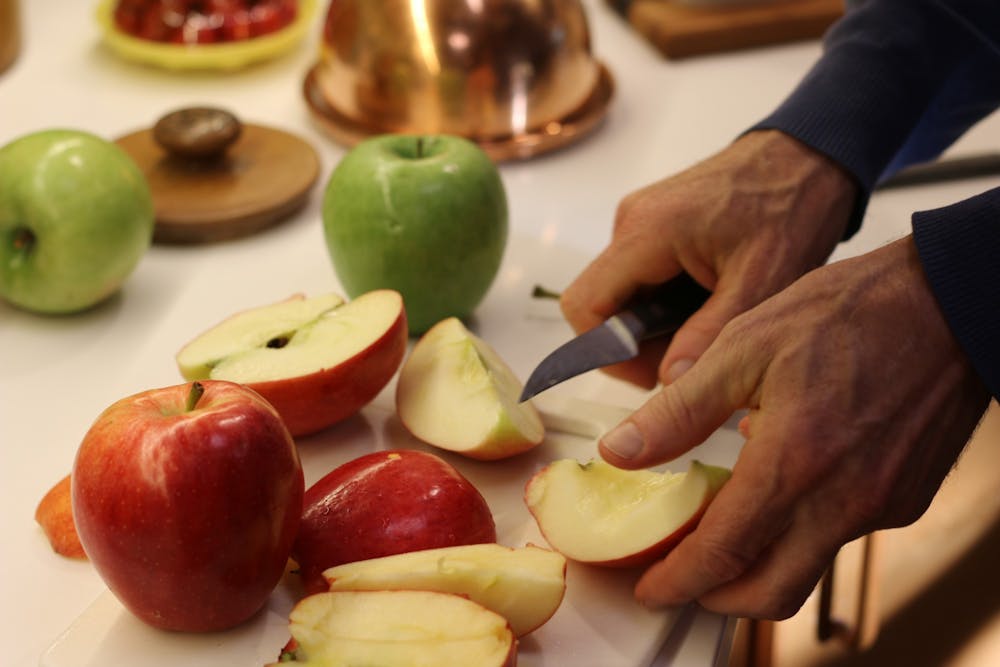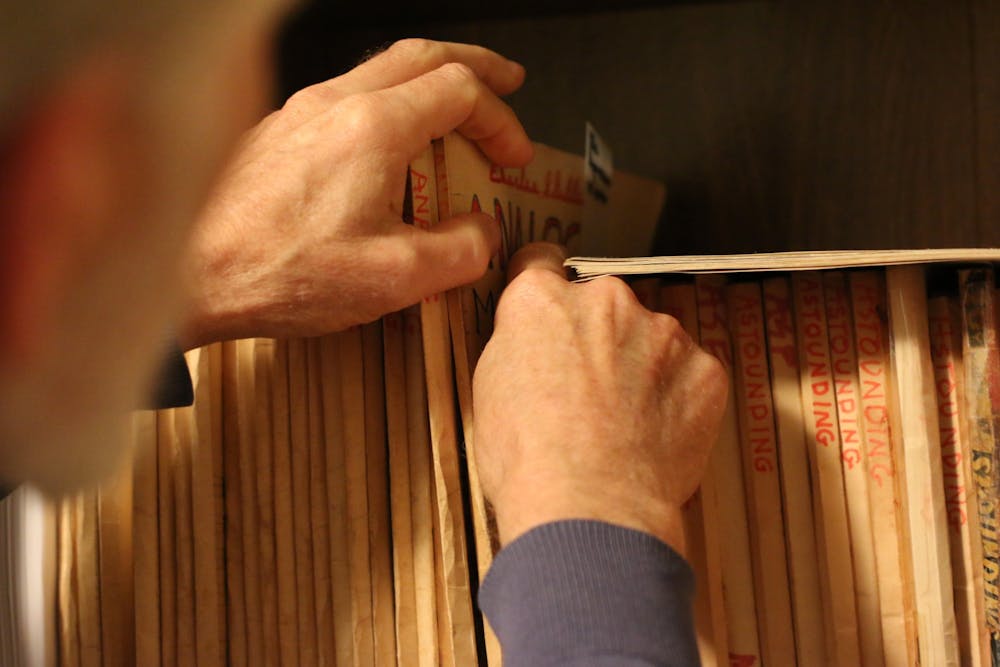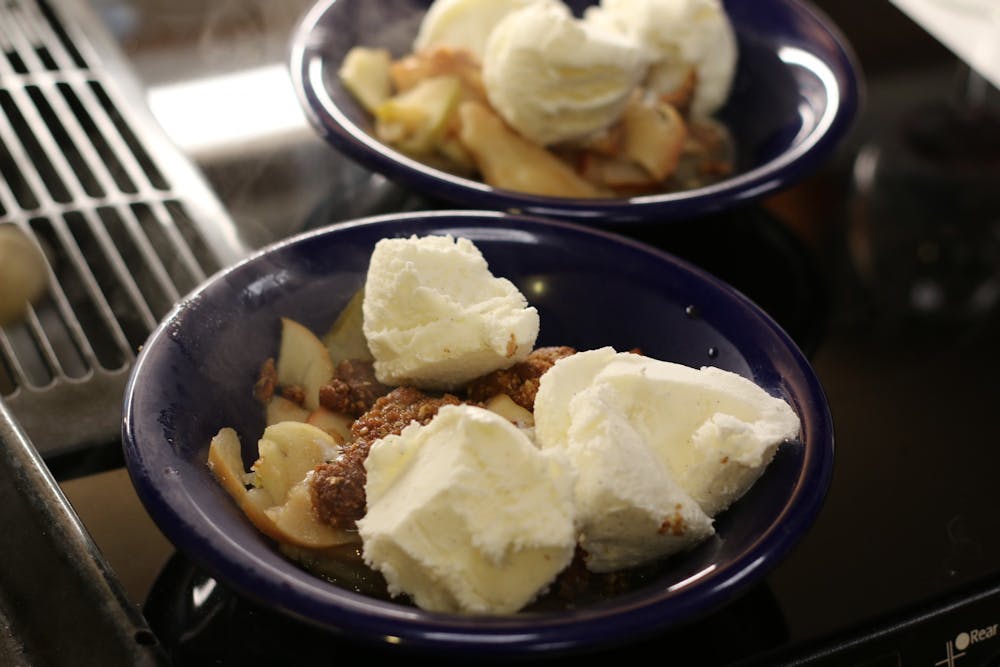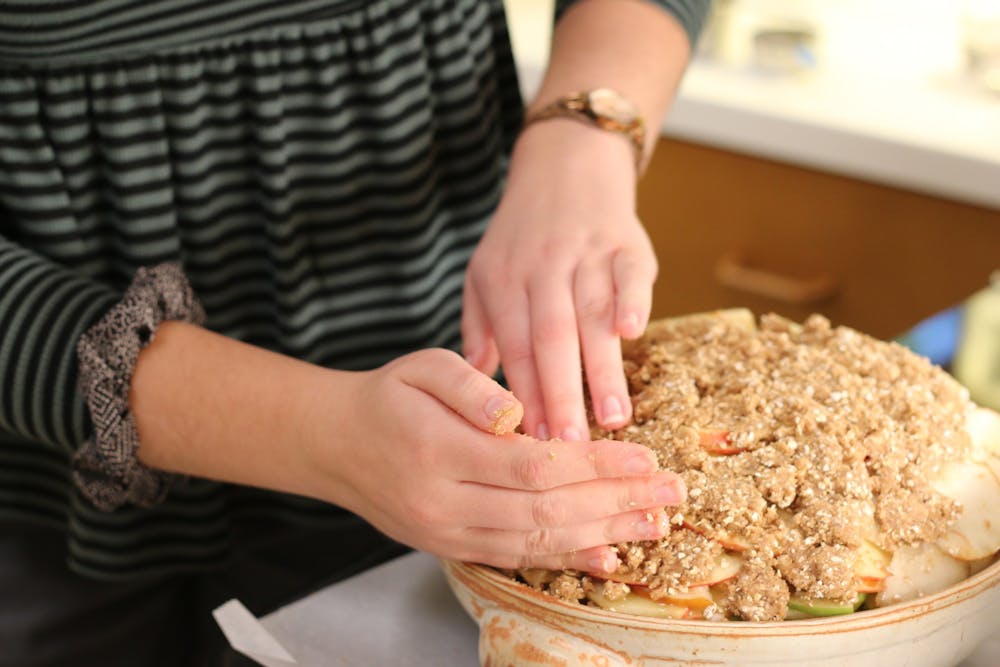Margot:
Nietzsche and Kant are holding hands. Well, their tiny felt replicas are, as puppets magnetized to Michael Gillespie’s fridge. Gillespie is a longtime Duke professor and renowned political theorist specializing in theology and German existentialism. Duke pays him to talk to students about how to lead a meaningful life, but today we’re talking about his cats, his kid and his wife’s apple crisp.
When I first met Professor Gillespie on a high-school visit to Duke, I decided he was my personal Dumbledore. The physical resemblance is strong—Gillespie, who rotates through a multicolored array of turtlenecks and keeps his white beard neatly trimmed, looks like the Hogwarts headmaster assimilated into muggle society. But still more Dumbledore-like is his thirst to acquire and pass on knowledge. He started with his son (his “greatest student,” as he told us), then the Visions of Freedom FOCUS, then the AB Duke merit scholars, helping students build lives for their passions.
So the puppets on the fridge make total sense. They’re among the giants of Gillespie’s field, yes, but here they’re softened to playful caricatures, now accessible. And they’re holding hands: we’re not alone on the road.
Taylor:
The camera around my neck keeps me out of the line of fire that is Gillespie’s providence over his own kitchen. Margot is less fortunate. She cores apples under his close watch while from afar I fiddle with my manual focus. Oh no—no, her technique is all wrong. You have to curve the knife around like this. Through my viewfinder, I watch her mess up; I watch him correct. She just doesn’t get it. But then she does.
Gillespie’s personal philosophy places apple-coring within the set of Things Everyone Must Know. He adds to this list: how to listen, how to explain things without using jargon, how to hammer in a nail. And then there’s Margot’s next trial—how to use the mandoline function on a Cuisinart food processor.
Soon, the air is live with whizzing apple shrapnel. Each small explosion alights in the liquid glow of his mid century-modern kitchen, an immaculate space complete with an alphabetically-ordered spice cabinet. Its sanctity will not stand the test of Margot’s mandolining, but Gillespie keeps his cool. With a father’s visible restraint, he sticks to his perch against the opposite countertop as he delivers instructions meant to resurrect her hack job. Turn the blade upside-down before you put it on the counter. She does not. Juice everywhere. He smiles.

We’re making an apple crisp tonight. It’s usually a Thanksgivings-or-maybe-birthdays affair. Read: labor intensive. While various hands and instruments produce enough bakeable fruit to fill a bowl the size of the kitchen sink, Gillespie does his Julia Child impression. Apparently she once did a cooking demonstration at his Harvard residence college in undergrad. More apparently, he doesn’t do a great Julia Child impression.
Now it’s my turn to get skin in the game. I’m to pack the apples down to maximum density and press our sugar-butter crumble over the top. If my form fails, Gillespie never interjects. But I suspect that’s because every time I spill something, he gets to pop it in his mouth.
Margot:
We shove the apple behemoth in the oven, then wander through the house. In the kitchen earlier, he told us colorful stories from his life. His eggplant souffle, the first dish he ever cooked, was “so horrible even the dog wouldn’t eat it” (he hadn’t seen the use in separating the eggs). A nightmare summer job testing experimental animal cages helped him meet an ex-convict and a man with Down’s Syndrome who were grateful despite their circumstances (“I learned a lot about gratitude that summer.”).
Now, in an homage to the stories which have shaped him, he leads us right downstairs to his bookshelves. They’re packed with original copies of sci-fi classics, meticulously covered in his father’s handmade dust jackets. Lovingly, he pulls out the story which spawned “Dune,” the best-selling sci-fi novel of all time, then copy after copy of books he recalls devouring as a child. They draw out his academic sensibilities now—Dan Simmons’ “Hyperion,” he explains, is a rewriting of the Canterbury tales—but the undercurrent of whimsy is still palpable. He still loves imagining other worlds.

Taylor:
At the top of the stairs, we can all smell it: spiced molten sugar bubbling against cooked apple. The living room’s soaring expanse of window, brilliant with daylight when we first arrived, now frames the forest’s silhouette against a late-setting sun. The sudden darkness shrinks the house into a cozy cocoon. Fifteen minutes to tart.
Whatever has changed in the atmosphere now cues Gillespie literatus. Sunk sleepy into overstuffed couches, we’re treated to Twain’s satire in “Fenimore Cooper’s Literary Offenses” (“You can’t dam up a river to look for footprints in it. Just try it once and see what happens!”) and learn why Austen’s novels don’t translate (“She’s like a miniaturist painter who gets every tiny detail right. You can’t do that in another language”).
But for all his prowess, Gillespie resists taking academia (or himself) too seriously. His favorite coffee table book is “Why Paint Cats,” a tongue-in-cheek critical exploration of cat fur as canvas traversing such artistic schools as Neo-Totemism and Semiotic Anthropomorphism. Gosh, does it make the man giggle. We’re studying a cat with Charlie Chaplin painted on its nether end when the timer goes off. Back in the kitchen, we attend the steaming leviathan.
Margot:
The thing is massive. With the touch of a spoon, its bronze dome parts to reveal a bountiful pool of juices—I’m stunned it didn’t overflow in the oven. “Right now, it’s too hot to eat,” Gillespie muses, “unless, of course, we pull out the vanilla ice cream.”
He doesn’t ask how many scoops we want. Three each—this, apparently, is how it’s done.
Taylor:
And soon we understand why; the stuff melts into the steaming juice and forms a sort of ambrosial gravy. We never learn why he chose this extra-special-occasion goliath of a dessert for tonight, but he does tell us that “people have a maximum of seven or eight decisions they can make in a day, and deciding on this tart was one.” We’re thankful for that.

Margot Armbruster is a Trinity sophomore and Taylor Plett is a Trinity junior. Their column, "bread talks," runs on alternate Mondays.
Get The Chronicle straight to your inbox
Signup for our weekly newsletter. Cancel at any time.

Margot Armbruster is a Trinity senior and opinion editor of The Chronicle's 117th volume.

